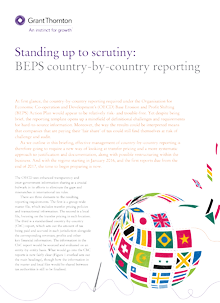-
Financial reporting advisory
Our Financial Reporting Advisory team helps clients understand changes in accounting standards and develop change strategies.
-
Advisory Services
Every business is different, the challenges they face vary but all need bespoke solutions. Businesses also share common ground when it comes to striving for reducing costs and improving efficiencies.
-
Audit and Assurance Services
Grant Thornton’s audit methodology harnesses proven processes and cutting-edge technology to deliver business benefits.
-
Transaction Advisory Services
Transactions are significant events in the life of a business, so the stakes are high for both buyers and sellers.
At first glance, the country-by-country (CbC) reporting required under the OECD Base Erosion and Profit Shifting Action Plan would appear to be relatively risk- and trouble-free. Yet despite being brief it opens up a minefield of definitional challenges and requirements.
In this briefing we outline how effective management of CBC reporting is going to require a new way of looking at transfer pricing and a more systematic approach to justification and documentation, along with possible restructuring within the business.
So why is CbC reporting generating a growing amount of concern?
The first challenge is that a lot of the information is hard to source or evaluate. While detailed data in areas such as headcount are typically available at divisional level, many firms will find it difficult to break this down to the entity level as required under CbC reporting.
This means that CbC reporting will be a much more demanding exercise than the template forms would suggest. While larger businesses generally have the necessary people and systems in place, many of their mid-size counterparts will need to develop the required capabilities from scratch.
Risk of misinterpretation
CbC reporting also opens up new risks. In particular, a local tax authority could compare the headcount to the amount of tax a company is paying in their jurisdiction and conclude that they are missing out on their rightful share of the overall tax take.
So how can you prepare?
With the regime starting in January 2016, and the first reports due from the end of 2017, the time to begin preparing is now, but how?
1. Gap analysis
The first step would be to complete the template as a dry run and then use this as the basis for a gap analysis of what information needs to be sourced.
2. Assess how you tax arrangements will come across
How the tax you pay compare to headcounts and returns on the template form. Then assess whether there are apparent anomalies.
3. Prepare robust justification
It’s important to ensure that tax allocations are substantiated by appropriate justification and supporting documentation.
4. Begin restructuring in good time
The complexities of entity reporting are likely to provide a fresh catalyst for the rationalisation of multiple entities.
While preparing fully now may be a time consuming and expensive exercise, it puts you in greater control over your tax affairs by making it easier to demonstrate that your company is paying its share.
Talk to your local firm about how Grant Thornton can help your organisation prepare for Country by Country Reporting requirements.

